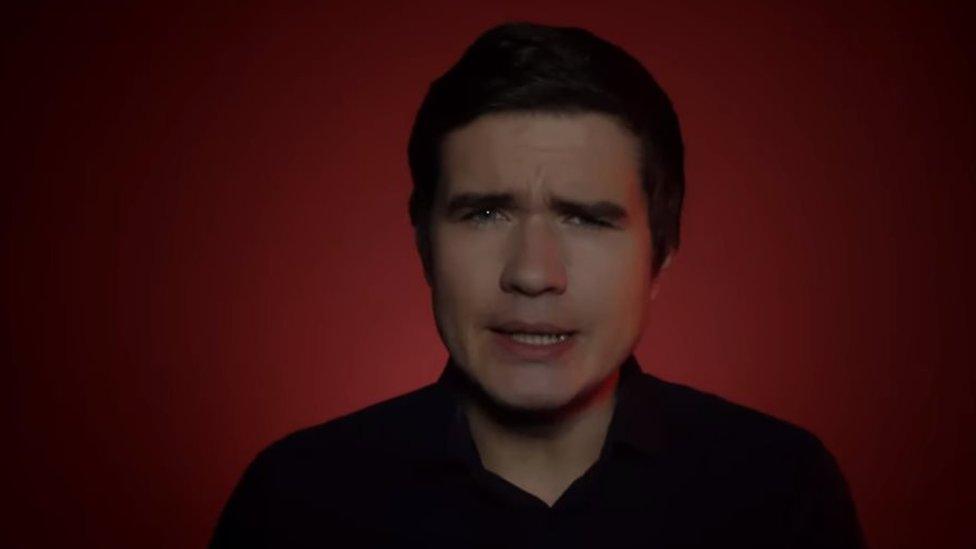Ivan Golunov: Russian newspapers in rare support for charged reporter
- Published
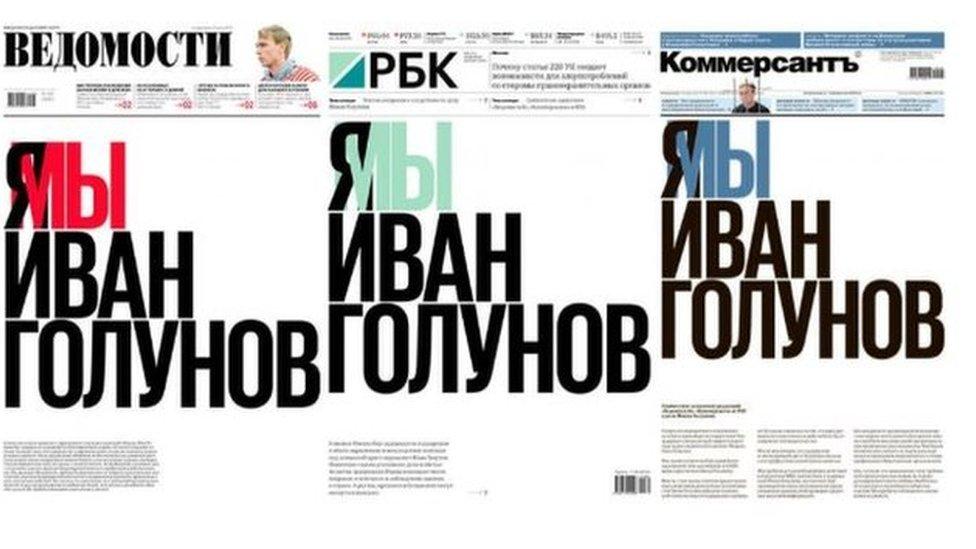
Three of Russia's leading newspapers have come out in support of a reporter charged with drug offences, in a case that has caused a huge public outcry.
The front page headlines in Vedomosti, RBC, and Kommersant read "We are Ivan Golunov", referring to the investigative journalist.
Mr Golunov was charged over the weekend with trying to illegally sell drugs. His lawyer said the drugs were planted.
The journalist was reportedly beaten up during his arrest last week.
Mr Golunov, 36, is a freelance journalist, who has contributed to a number of media outlets including the Latvia-based news site Meduza.
His arrest led to heated discussions among social media users in Russia, with many accusing the authorities of trying to stifle freedom of press.
Police moved in and made arrests as protesters gathered outside the court
Kremlin spokesman Dmitry Peskov said President Vladimir Putin was made aware of the case last week and was "keeping a very close eye on all the details".
"Mistakes cannot be ruled out anywhere or anytime, mistakes are made, among others, by journalists, when they write stories," Mr Peskov said.
On Sunday, a Moscow court ordered that Mr Golunov be placed under house arrest rather than remanded in custody, which is standard procedure in drug-related cases in Russia.
Journalists in Russia have in recent years often been harassed or attacked for their work. Many opposition figures and human rights activists in Russia have been detained on apparently fabricated drugs charges, which are widely seen as an attempt to quash political dissent.
Much of Russia's media is controlled by the state and Russia is ranked 83rd out of 100 countries for press freedom by Freedom House, external.
What did the Russian papers say?
The three business dailies on Monday published a joint statement, openly questioning the legality of Mr Golunov's arrest.
"We do not consider convincing the evidence presented by investigators into the guilt of Ivan Golunov," the statement said.
"We are not ruling out that the detention and the subsequent arrest of Mr Golunov are connected to his professional activities."
The newspapers also demanded a thorough investigation into how police acted during the arrest.
Allow X content?
This article contains content provided by X. We ask for your permission before anything is loaded, as they may be using cookies and other technologies. You may want to read X’s cookie policy, external and privacy policy, external before accepting. To view this content choose ‘accept and continue’.

'It feels like a watershed moment'
BBC Moscow correspondent Steve Rosenberg writes:
In the world of Russian media, acts of solidarity are rare. That's why the decision by Vedomosti, RBC and Kommersant to print almost identical front pages is significant.
It feels like Ivan Golunov's detention is a watershed moment: when Russian journalists from across the political spectrum realised the "system" had gone too far.
Even prominent pro-Kremlin broadcasters have been critical of the case.
Anchor Irada Zeynalova of pro-Kremlin channel NTV said: "Journalists are not angels, but neither are police… If there were no drugs on him (Golunov), those who created this crazy situation must be punished."
And Russian state TV presenter Dmitry Kiselyov, often referred to as the "Kremlin's chief propagandist", admitted that it appeared the two officers who had detained Mr Golunov "were not blameless and had acted quite roughly".
So, will the authorities backtrack?
In one sense they already have (though perhaps only temporarily). The fact that Mr Golunov is currently under house arrest, and not behind bars, is a consequence of the huge public outcry.
But getting the charges dropped completely will be difficult. The one lever that the punitive machine constructed under President Vladimir Putin lacks is a reverse gear. In Russia, most cases go to court and end in a guilty verdict.

What is known about Mr Golunov's arrest?
He had been on his way to meet another journalist last Thursday when he was stopped and searched by officers.
Police said they found the synthetic drug mephedrone in his rucksack, and that a later search of his flat turned up more drugs and some scales - indicating that he was involved in dealing.
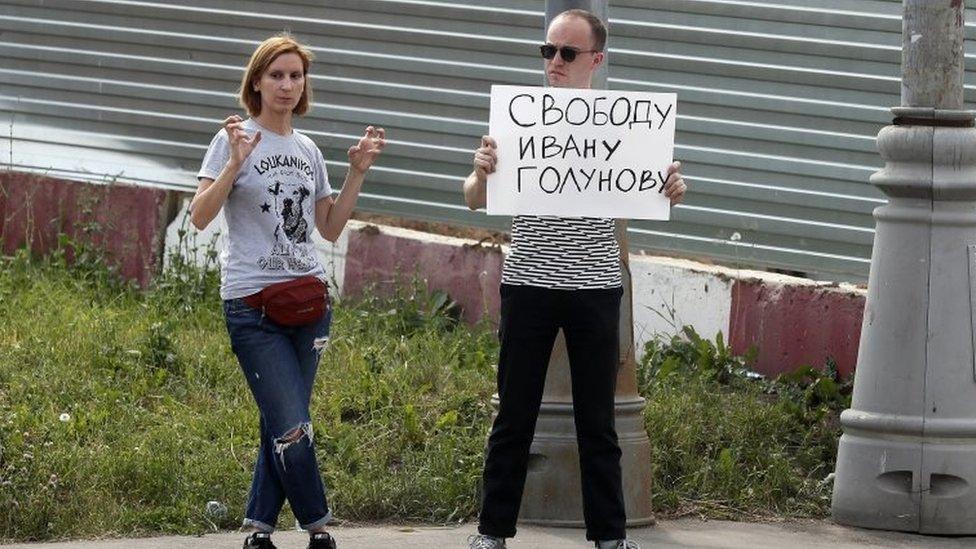
Protesters have picketed Moscow's court, saying Ivan Golunov must be freed
The journalist was later charged with attempting illegally to produce, sell or pass on drugs.
Police released photos which they said showed drug paraphernalia in Mr Golunov's flat, but the images were later withdrawn.
Police then admitted that most of the published photos had not been taken at Mr Golunov's flat after all, but were related to another criminal investigation they said might be linked to his detention.
Meduza said in a statement, published by the Reuters news agency, that Mr Golunov had received threats in recent months over a story he was working on.
"We are convinced that Ivan Golunov is innocent," the statement said. "Moreover, we have grounds to believe that Golunov is being persecuted because of his journalistic activity."
What do we know about his condition?
A medical examination at hospital showed that Mr Golunov had an abrasion on his back and bruising around one eye but no serious injuries that required a stay in hospital, Dr Alexander Myasnikov told Russian media over the weekend.
None of his ribs were broken, Dr Myasnikov said, following earlier claims that the journalist had suffered a fracture.
Meduza said Mr Golunov was beaten up by officers both during his arrest and later at a police station. He was, the news site said, only able to contact a friend after 14 hours.
In the first video of Mr Golunov since his arrest, posted by the Russian news site Breaking Mash, he can be seen lifting up his shirt to reveal marks on his back.
Allow X content?
This article contains content provided by X. We ask for your permission before anything is loaded, as they may be using cookies and other technologies. You may want to read X’s cookie policy, external and privacy policy, external before accepting. To view this content choose ‘accept and continue’.

Mr Golunov said he had been involved in "scuffles" with police, and showed bruises. His lawyer, Dmitry Julay, told reporters that the journalist had been denied food and sleep for more than 24 hours.
Who is Ivan Golunov?
Mr Golunov is by no means a household name in Russia, although he is well known among the more independent journalists and their readership, which is admittedly dwarfed by that of Kremlin-controlled media, BBC Monitoring's Vitaliy Shevchenko says.
The journalist has repeatedly exposed corruption among Moscow's high-profile businesspeople and its political elite, as well as fraudulent financial schemes in the city.
It is these investigations, his supporters say, that caused his arrest, and not the drugs that they said were planted on the journalist.
One popular opinion is that his future article about Federal Security Service (FSB) officers allegedly controlling the cut-throat funeral services market in Moscow was the last straw that moved corrupt officials to act.
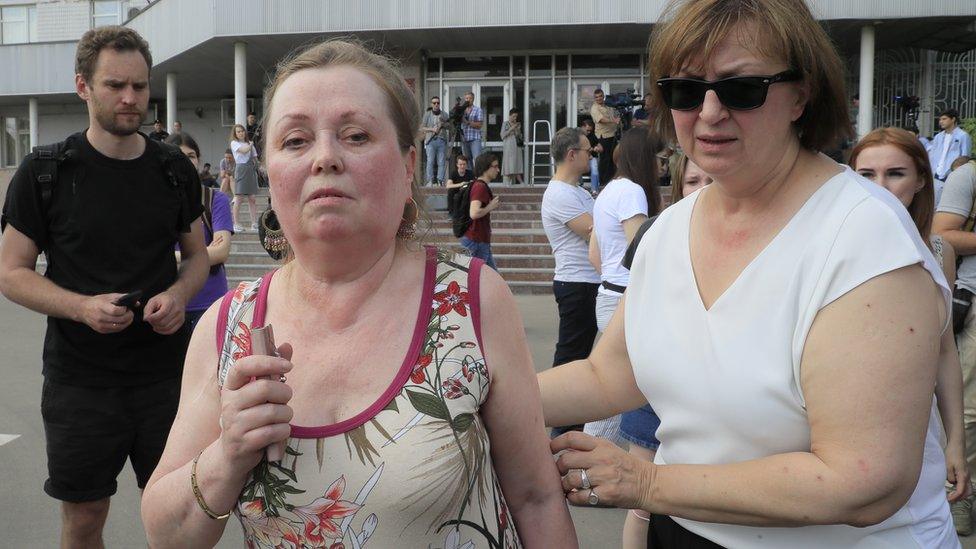
Mr Golunov's mother Svetlana (centre) with Galina Timchenko
The journalist's arrest sparked protests in Moscow and St Petersburg, and more than a dozen people - mostly fellow journalists - were reportedly detained, external and later released.
On Saturday, police detained several people trying to protest about the arrest outside Moscow's Nikulinsky Court.
Mr Golunov's mother, Svetlana Golunova, told Reuters the arrest was "not even a farce, it is something unbelievable", and she expected "only victory".
In a separate development on Monday, a Russian court granted the early release of Oyub Titiyev, the head of the Chechen division of human rights group Memorial, who was sentenced to four years in prison in March on drugs charges.
The court ruled that Mr Titiyev, 61, must be released within 10 days.
He was arrested last year after police discovered marijuana in his car. Shortly after his detention, Mr Titiyev wrote an open letter to Mr Putin insisting that the drugs were planted.
- Published7 March 2019
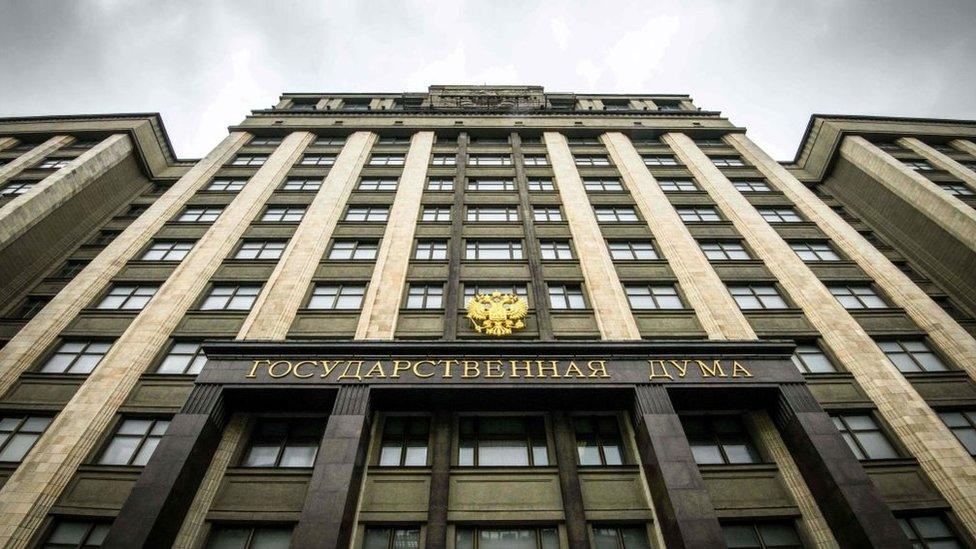
- Published4 June 2019
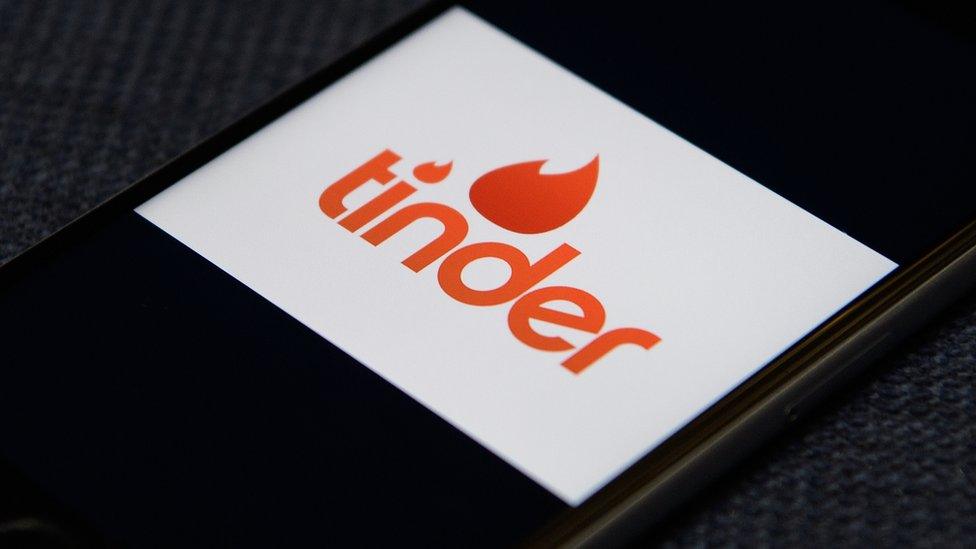
- Published4 June 2019
